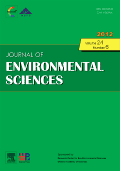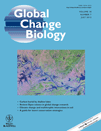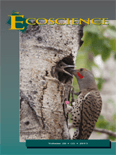
Journal of Environmental Sciences
Scope & Guideline
Exploring Solutions to Global Environmental Challenges
Introduction
Aims and Scopes
- Environmental Impact Assessment:
The journal focuses on assessing the impact of various human activities, including urbanization, agriculture, and industrial processes, on the environment. This includes studies on pollution, biodiversity loss, and ecosystem health. - Biodiversity and Conservation Biology:
Research published in the journal often emphasizes the importance of biodiversity conservation, exploring strategies for managing and protecting endangered species and habitats. - Ecological Restoration and Management:
The journal discusses methodologies for restoring degraded ecosystems and highlights case studies that demonstrate successful management practices across different environments. - Climate Change and Its Effects:
A core area of focus includes studying the effects of climate change on various ecosystems and species, providing insights into adaptation strategies and mitigation efforts. - Sustainable Practices and Policy Development:
The journal also contributes to the discourse on sustainable development practices and policies, encouraging interdisciplinary approaches to solve environmental issues.
Trending and Emerging
- Urbanization and Its Environmental Impact:
There is an increasing focus on how urbanization affects local ecosystems, thermal dynamics, and biodiversity, underscoring the need for sustainable urban planning. - Effects of Climate Change on Biodiversity:
Research is increasingly examining the ramifications of climate change on species distribution and ecosystem health, emphasizing the urgency of understanding these dynamics for conservation efforts. - Humanitarian and Legal Perspectives on Environmental Issues:
Emerging themes include the intersection of humanitarian law and environmental degradation, particularly in conflict zones, reflecting a growing recognition of the legal dimensions of ecological crises. - Invasive Species Management:
There is a rising concern regarding invasive species and their management, indicating a shift towards understanding and mitigating their impacts on native biodiversity. - Phytoremediation and Soil Health:
Research on the use of plants for the remediation of contaminated soils is gaining traction, highlighting innovative approaches to environmental restoration and sustainability.
Declining or Waning
- Forensic Ecology:
Research focusing on the application of ecological principles in forensic science has appeared less frequently. This may suggest that the integration of ecology in forensic contexts is becoming more specialized and thus less prevalent in general environmental science discussions. - Aquatic Ecosystem Studies:
Though important, studies specifically targeting aquatic ecosystems, particularly in freshwater contexts, appear to be declining. This could reflect a broader shift towards terrestrial and climate-related studies. - Soil Microbiology and Pathogen Studies:
There seems to be a waning interest in the specific interactions of soil microbiomes and pathogens, as fewer papers are dedicated to this niche area compared to previous years.
Similar Journals

Theoretical and Applied Ecology
Innovating Research in Theory and PracticeTheoretical and Applied Ecology, an esteemed journal published by LLC PUBLISHING HOUSE, KAMERTON, is dedicated to advancing knowledge in the rigorous fields of ecology and applied ecological research. With the ISSN 1995-4301 and E-ISSN 2618-8406, this journal has established a firm foothold since its inception in 2017, converging impressive research and findings from the Russian Federation and beyond. Although currently lacking an impact factor and H-index, its Q3 ranking in Ecology and Ecology, Evolution, Behavior and Systematics exemplifies its growing influence in the academic community. Furthermore, its rankings in Scopus highlight its relevance within the environmental sciences and agricultural sectors. Committed to providing open access to scholarly articles and fostering a collaborative approach to ecological research, Theoretical and Applied Ecology serves as a vital resource for researchers, professionals, and students eager to explore innovative ecological theories and applications that shape understanding and practices in ecology today.

Observatorio Medioambiental
Empowering Scholars to Drive Environmental ChangeObservatorio Medioambiental is a premier journal dedicated to advancing the understanding of environmental science and policy, published by UNIV COMPLUTENSE MADRID, SERVICIO PUBLICACIONES. With a strong commitment to scholarly excellence, this journal serves as a vital platform for researchers, professionals, and students interested in addressing contemporary environmental challenges through interdisciplinary studies. Although currently not listed as an Open Access journal, it maintains high academic standards, ensuring that published research contributes significantly to the field. The journal fosters the dissemination of knowledge regarding ecological conservation, sustainable development, and environmental management practices. By providing a rigorous peer-reviewed environment, Observatorio Medioambiental plays a crucial role in shaping informed and sustainable environmental policies and practices on both local and global scales.

International Journal of Environmental Science and Technology
Empowering researchers to shape environmental solutions.International Journal of Environmental Science and Technology, published by SPRINGER, stands as a premier platform for the dissemination of cutting-edge research in the fields of environmental science, technology, and engineering. With an impressive scope spanning from 2005 to 2024, this journal serves as a vital resource for academic and professional communities engaged in tackling pressing environmental challenges. It boasts a strong reputation, evidenced by its Q1 ranking in Agricultural and Biological Sciences and solid placements in Environmental Chemistry and Engineering. Researchers searching for high-impact studies will find the journal's contributions significant, as reflected in its rankings within Scopus: 34th percentile in Agricultural and Biological Sciences and notable standings in Environmental Engineering and Chemistry. Although the journal is not currently an Open Access resource, it maintains a commitment to academic rigor and innovation, making it indispensable for those devoted to advancing knowledge in environmental sustainability and technology.

Global Ecology and Conservation
Connecting researchers to inspire ecological stewardship.Global Ecology and Conservation, published by Elsevier, stands as a premier open-access journal dedicated to advancing the field of ecology and conservation science. Since its inception in 2014, the journal has facilitated the dissemination of high-quality research, fostering critical dialogue on ecosystem management, biodiversity preservation, and sustainability practices across the globe. With a remarkable ranking within the top quartiles (Q1) in various categories including Ecology, Evolution, Behavior and Systematics, and Nature and Landscape Conservation, it is positioned among the leading resources for researchers and professionals alike. The journal has garnered a notable impact, ranking #65 out of 721 in Ecology, and houses articles that are vital to understanding and addressing the pressing environmental challenges of our time. Available in an open-access format, researchers can freely access and share vital findings, promoting a collaborative approach to ecological research. Global Ecology and Conservation is not just a publication; it is a critical tool for innovation and advocacy in conservation, poised to inspire the next generation of environmental stewards.

ENVIRONMENTAL SCIENCE AND POLLUTION RESEARCH
Pioneering Research in Environmental ScienceEnvironmental Science and Pollution Research is a premier international journal published by Springer Heidelberg, dedicated to advancing knowledge in the field of environmental science and pollution. With an impressive impact factor reflecting its vital contributions to research, the journal is categorized in the top quartiles (Q1 and Q2) across several domains, including Health, Toxicology and Mutagenesis, and Environmental Chemistry. Established in 1994, it continues to be a critical resource for researchers, professionals, and students focusing on pressing environmental issues. The journal provides an insightful platform for disseminating significant findings related to pollution and its effects on health and the environment, contributing to a better understanding and resolution of these challenges. While it currently does not offer Open Access options, its inclusion in prominent rankings, such as the Scopus rankings, underscores its reputation and influence within the scientific community.

M+A-Revista Electronica de Medio Ambiente
Advancing Environmental Knowledge for a Sustainable FutureM+A-Revista Electronica de Medio Ambiente, published by Universidad Complutense de Madrid, Servicio Publicaciones, is a leading open-access journal dedicated to advancing the field of environmental science and policy. With an ISSN of 1886-3329, this journal serves as a vital platform for researchers, professionals, and students to disseminate innovative findings and insights related to environmental issues, sustainability practices, and ecological conservation. The journal aims to foster interdisciplinary collaboration and strengthen the dialogue between academia and practitioners in addressing pressing environmental challenges. Situated in Madrid, Spain, it actively contributes to the global discourse on ecological matters, encouraging the submission of high-quality research articles, reviews, and case studies. By providing accessible and relevant content, M+A-Revista Electronica de Medio Ambiente significantly impacts the advancement of knowledge in this critical domain.

GLOBAL CHANGE BIOLOGY
Innovating Research for a Sustainable PlanetGLOBAL CHANGE BIOLOGY, published by Wiley, is a leading journal dedicated to advancing the scientific understanding of the relationships between biological systems and global environmental changes. With an impressive impact factor placing it in the Q1 category across multiple disciplines—including Ecology, Environmental Chemistry, and Global and Planetary Change—this journal is essential for researchers, professionals, and students aiming to stay at the forefront of this dynamic field. The journal has a rich history since its inception in 1995, continually providing a platform for high-quality research that informs policy and management practices worldwide. Although it is not open access, the journal remains a valuable resource for those committed to exploring the complexities of ecological and environmental change. With a Scopus ranking of #3 in Global and Planetary Change and #6 in both Ecology and Environmental Chemistry, GLOBAL CHANGE BIOLOGY continues to shape the dialogue on the pressing environmental challenges of our time.

EARTH is a prestigious journal published by MDPI, located in Switzerland, with a commitment to advancing the fields of Earth and Planetary Sciences and Environmental Science. Launched in 2020, the journal emphasizes an open-access publication model, ensuring that high-quality research is widely accessible to the scientific community and beyond. As of 2023, it proudly holds a Q2 ranking in both the Environmental Science and Earth and Planetary Sciences categories, indicating its significant impact within these disciplines; it ranks #90 out of 219 and #70 out of 159 in their respective fields according to Scopus. With the convergence of multidisciplinary research and the critical challenges our planet faces, EARTH seeks to publish innovative studies that foster a deeper understanding of geological and environmental processes. Researchers, professionals, and students alike will find this journal an invaluable resource for the latest findings and discussions shaping our understanding of Earth sciences.

ECOSCIENCE
Connecting researchers to shape the future of our environment.ECOSCIENCE, published by Taylor & Francis Inc, stands as a prominent journal in the fields of Ecology and Environmental Science, recognized for its commitment to advancing knowledge since its inception in 1994. With an ISSN of 1195-6860 and an E-ISSN of 2376-7626, the journal caters to a diverse audience of researchers, professionals, and students passionate about ecological and environmental issues. In 2023, it achieved Q2 and Q3 rankings in the Scopus category of Ecology and Evolution, Behavior and Systematics, reflecting its significance within the academic community. Moreover, ECOSCIENCE occupies notable positions in Scopus rankings, including Rank #324 in Agricultural and Biological Sciences and Rank #210 in Environmental Science, symbolizing its role as a catalyst for disseminating high-quality research. Although currently not open access, the journal's multifaceted scope encourages in-depth discussions on ecological diversity, conservation strategies, and sustainable practices, making it an invaluable resource for those engaged in ecological research and practice.

GLOBAL JOURNAL OF ENVIRONMENTAL SCIENCE AND MANAGEMENT-GJESM
Connecting research and practice to tackle environmental challenges.Global Journal of Environmental Science and Management (GJESM), published under the distinguished leadership of Professor J. Nouri, is an esteemed academic platform dedicated to advancing the interdisciplinary discourse surrounding environmental science and management. With an ISSN of 2383-3572 and an E-ISSN of 2383-3866, GJESM has established itself as a prominent Open Access journal since 2014, allowing for unrestricted sharing of knowledge and research findings. Based in Iran, this journal caters to a diverse global audience, featuring contributions that span various critical domains including agricultural and biological sciences, environmental engineering, pollution management, and social sciences, evidenced by its impressive 2023 Q1 and Q2 quartile rankings across multiple categories. The journal’s Scopus rankings demonstrate a robust standing in the academic landscape, with exciting placements that underscore its relevance in key fields. By bridging the gap between scientific inquiry and practical application, GJESM serves as a vital resource for researchers, practitioners, and students seeking to understand and address the pressing environmental challenges faced by our planet today.